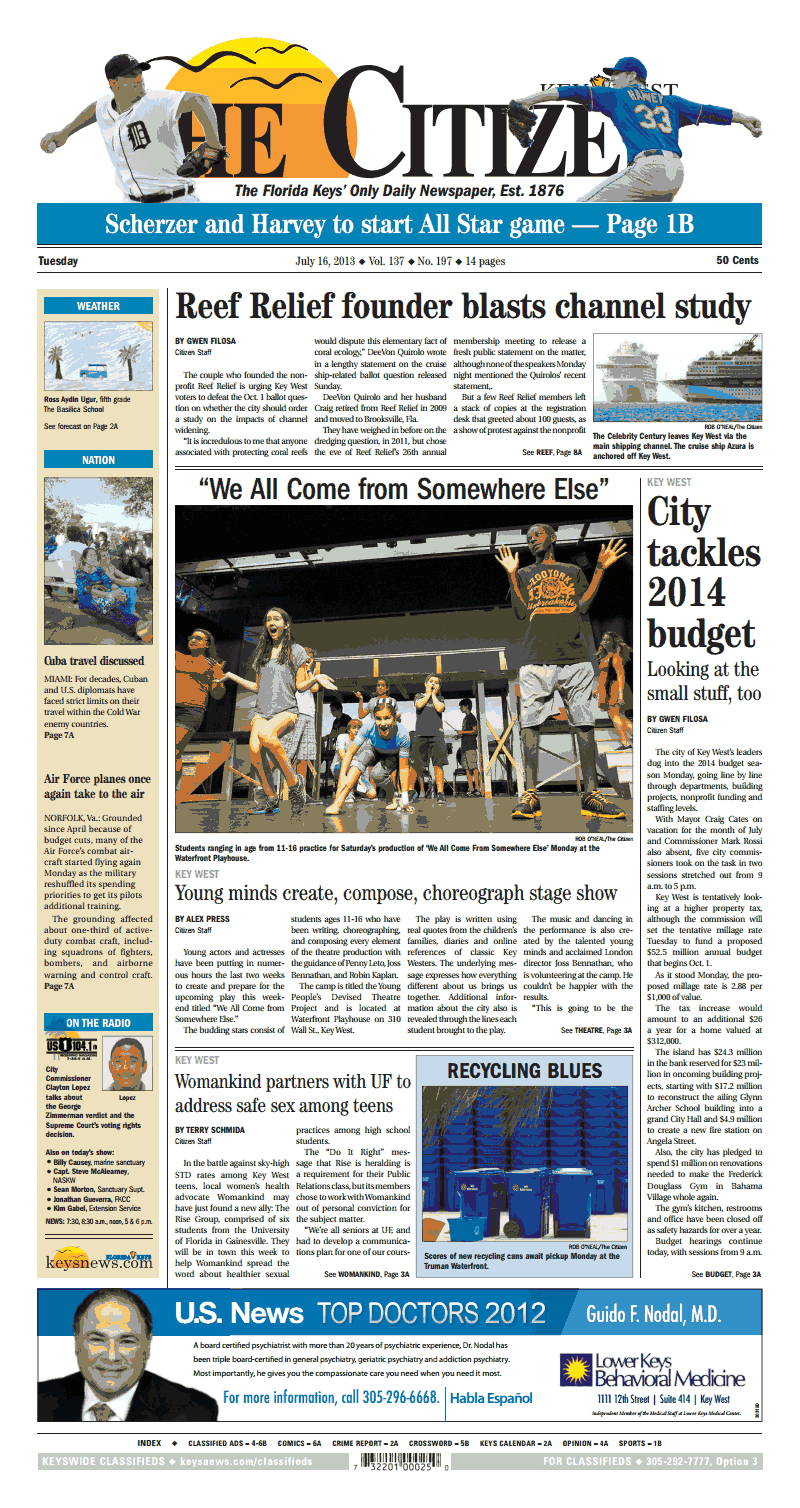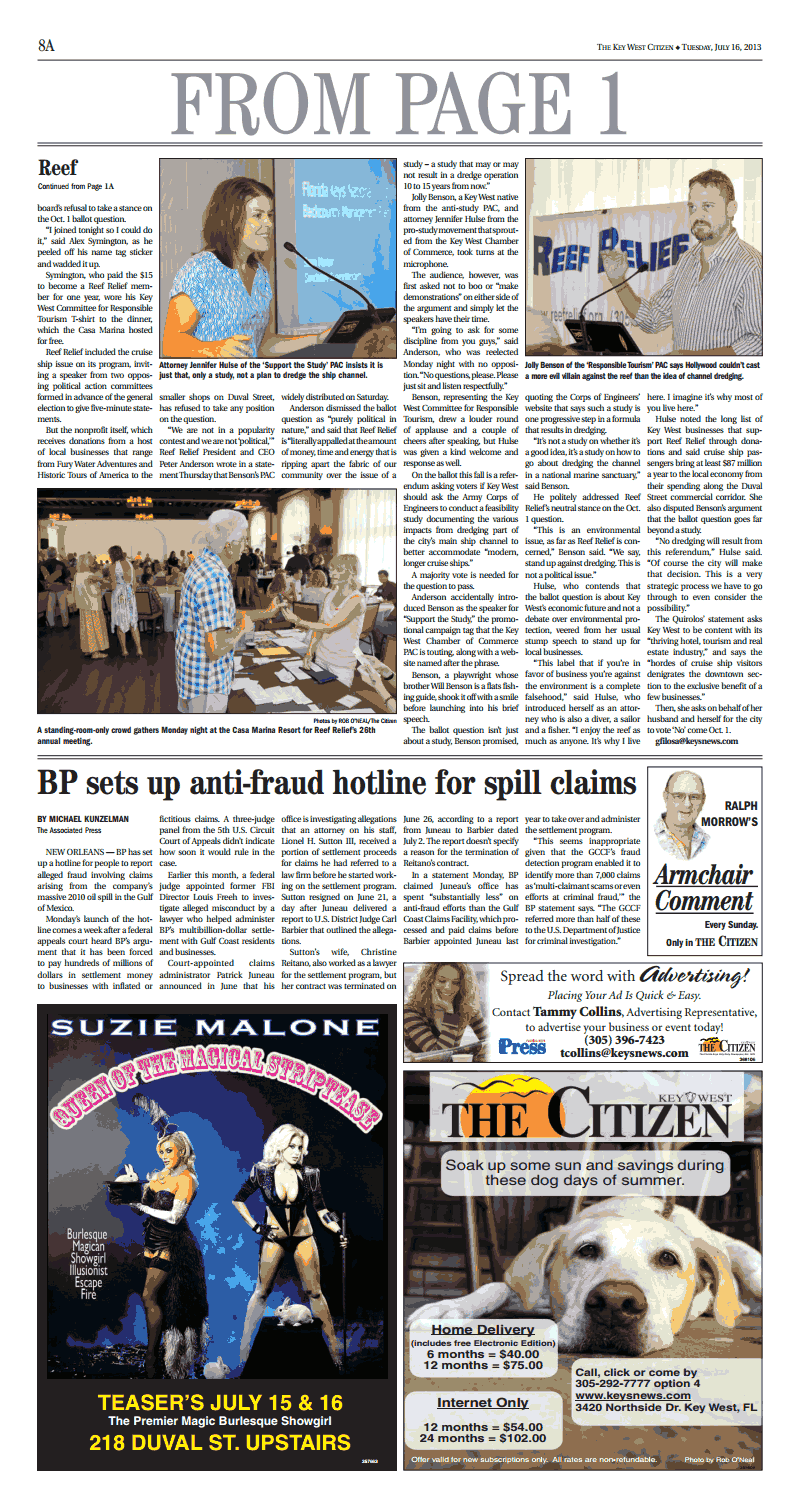The couple who founded the nonprofit Reef Relief is urging Key West voters to defeat the Oct. 1 ballot question on whether the city should order a study on the impacts of channel widening.
“It is incredulous to me that anyone associated with protecting coral reefs would dispute this elementary fact of coral ecology,” DeeVon Quirolo wrote in a lengthy statement on the cruise ship-related ballot question released Sunday.
DeeVon Quirolo and her husband Craig retired from Reef Relief in 2009 and moved to Brooksville, Fla.
They have weighed in before on the dredging question, in 2011, but chose the eve of Reef Relief’s 26th annual membership meeting to release a fresh public statement on the matter, although none of the speakers Monday night mentioned the Quirolos’ recent statement,.
But a few Reef Relief members left a stack of copies at the registration desk that greeted about 100 guests, as a show of protest against the nonprofit board’s refusal to take a stance on the Oct. 1 ballot question.
“I joined tonight so I could do it,” said Alex Symington, as he peeled off his name tag sticker and wadded it up.
Symington, who paid the $15 to become a Reef Relief member for one year, wore his Key West Committee for Responsible Tourism T-shirt to the dinner, which the Casa Marina hosted for free.
Reef Relief included the cruise ship issue on its program, inviting a speaker from two opposing political action committees formed in advance of the general election to give five-minute statements.
But the nonprofit itself, which receives donations from a host of local businesses that range from Fury Water Adventures and Historic Tours of America to the smaller shops on Duval Street, has refused to take any position on the question.
“We are not in a popularity contest and we are not ‘political,'” Reef Relief President and CEO Peter Anderson wrote in a statement Thursday that Benson’s PAC widely distributed on Saturday.
Anderson dismissed the ballot question as “purely political in nature,” and said that Reef Relief is “literally appalled at the amount of money, time and energy that is ripping apart the fabric of our community over the issue of a study – a study that may or may not result in a dredge operation 10 to 15 years from now.”
Jolly Benson, a Key West native from the anti-study PAC, and attorney Jennifer Hulse from the pro-study movement that sprouted from the Key West Chamber of Commerce, took turns at the microphone.
The audience, however, was first asked not to boo or “make demonstrations” on either side of the argument and simply let the speakers have their time.
“I’m going to ask for some discipline from you guys,” said Anderson, who was reelected Monday night with no opposition. “No questions, please. Please just sit and listen respectfully.”
Benson, representing the Key West Committee for Responsible Tourism, drew a louder round of applause and a couple of cheers after speaking, but Hulse was given a kind welcome and response as well.
On the ballot this fall is a referendum asking voters if Key West should ask the Army Corps of Engineers to conduct a feasibility study documenting the various impacts from dredging part of the city’s main ship channel to better accommodate “modern, longer cruise ships.”
A majority vote is needed for the question to pass.
Anderson accidentally introduced Benson as the speaker for “Support the Study,” the promotional campaign tag that the Key West Chamber of Commerce PAC is touting, along with a website named after the phrase.
Benson, a playwright whose brother Will Benson is a flats fishing guide, shook it off with a smile before launching into his brief speech.
The ballot question isn’t just about a study, Benson promised, quoting the Corps of Engineers’ website that says such a study is one progressive step in a formula that results in dredging.
“It’s not a study on whether it’s a good idea, it’s a study on how to go about dredging the channel in a national marine sanctuary,” said Benson.
He politely addressed Reef Relief’s neutral stance on the Oct. 1 question.
“This is an environmental issue, as far as Reef Relief is concerned,” Benson said. “We say, stand up against dredging. This is not a political issue.”
Hulse, who contends that the ballot question is about Key West’s economic future and not a debate over environmental protection, veered from her usual stump speech to stand up for local businesses.
“This label that if you’re in favor of business you’re against the environment is a complete falsehood,” said Hulse, who introduced herself as an attorney who is also a diver, a sailor and a fisher. “I enjoy the reef as much as anyone. It’s why I live here. I imagine it’s why most of you live here.”
Hulse noted the long list of Key West businesses that support Reef Relief through donations and said cruise ship passengers bring at least $87 million a year to the local economy from their spending along the Duval Street commercial corridor. She also disputed Benson’s argument that the ballot question goes far beyond a study.
“No dredging will result from this referendum,” Hulse said. “Of course the city will make that decision. This is a very strategic process we have to go through to even consider the possibility.”
The Quirolos’ statement asks Key West to be content with its “thriving hotel, tourism and real estate industry,” and says the “hordes of cruise ship visitors denigrates the downtown section to the exclusive benefit of a few businesses.”
Then, she asks on behalf of her husband and herself for the city to vote ‘No’ come Oct. 1.
gfilosa@keysnews.com


